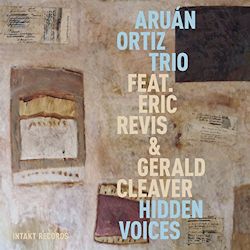 BUY NOW AmazonUK AmazonUS |
Aruán Ortiz Trio Hidden Voices
|
Fractal Sketches
Open and Close/The Sphinx
Caribbean Vortex/Hidden Voices
Analytical Symmetry
Arabesques of a Geometrical Rose (Spring)
Arabesques of a Geometrical Rose (Summer)
17 Moments of Liam's Moments
Joyful Noises
Skippy
Uno, Dos y Tres Que Paso Más Chévere.
Aruán Oritz (piano); Eric Revis (bass): Gerald Cleaver (drums)
Recorded March 2015, Sear Sound Studios
The Cuban-born, New York resident Aruán Ortiz has compiled a ten-track disc of which all but two pieces are his own compositions. The exceptions are Ornette Coleman’s Open and Close/The Sphinx and Thelonious Monk’s Skippy. The ethos throughout is largely free and because Ortiz is a questing pianist and Revis and Cleaver are amongst the most agile and freewheeling practitioners one is guaranteed literacy, articulacy and individual and collective virtuosity. As I’m working from a promotional copy I can’t tell if the commercial disc has explanatory notes that go into any detail regarding this 50-minute release.
Ortiz often favours little cell-like flurries as in the opener, Fractal Sketches, in which rhythmic patterns are quite tightly juxtaposed in support of this device. On Caribbean Vortex/Hidden Voices, the use of a two-man ‘clave section’ – courtesy of Arturo Stable and Enildo Rasúa – injects a taut and briefly insistent sonic variety to the programme. But the overarching imperative here is a kind of mathematical mosaic approach at the keyboard with free rhythms on bass and drums that sometimes allow Ortiz to slow to a languid, abstract chording, as he does on Analytical Symmetry. The two Arabesques, rather highfalutin titles one might suggest, offer asymmetries of their own, one devoted to Spring and the other to Summer – the former a piano solo of a harmonically piquant kind, the latter a trio performance.
Joyful Noises is a collective improvisation, whereas Skippy encourages brief allusions to Monk’s stylised keyboard playing and Open and Close/The Sphinx is a crisp, up-tempo and very ‘out’ number. To close, Ortiz draws on a piece by Rafael Ortiz called Uno, Dos y Tres Que Paso Más Chévere, a decidedly non-confrontational and ‘in’ piece that salutes the pianist’s heritage whilst sitting, to me at least, somewhat oddly in a programme of otherwise largely freeform intensity.
Jonathan Woolf